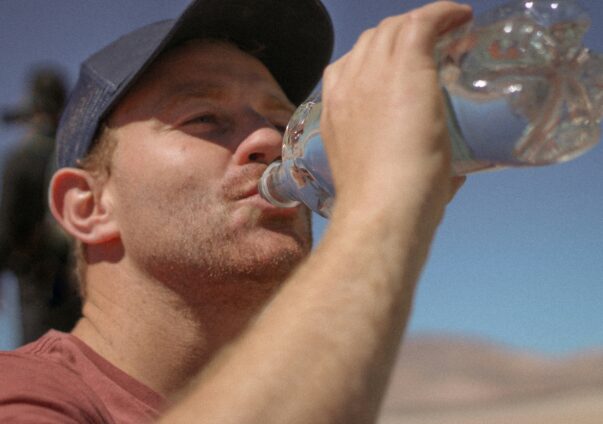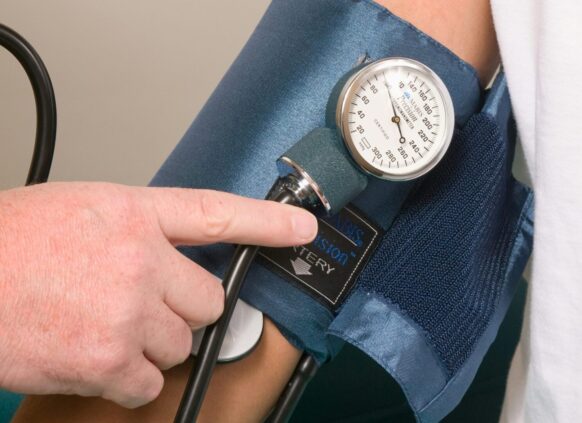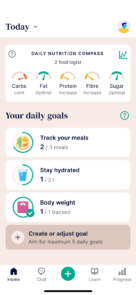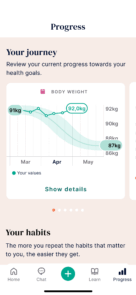
What are the weight loss benefits of giving up alcohol? + free alcohol calorie calculator
Reducing or cutting out alcohol can support your weight loss journey. Drinking less helps lower calorie intake, reduce bloating, and make it easier to stay motivated with healthy eating and exercise. It can also improve sleep, reduce anxiety, and lower the risk of health conditions like type 2 diabetes.
Making changes can feel challenging, but the right support helps. Oviva’s weight management programme can guide you in building sustainable habits and setting realistic goals, like reducing alcohol.
If you’re eligible, you could access Oviva’s Tier 3 weight management services through the NHS.
Key Takeaways
- Alcohol can make weight loss harder – it adds empty calories, disrupts sleep, increases cravings, and affects decision-making around food.
- Cutting out alcohol can have a big impact, helping to lower calorie intake, boost your mood, and improve motivation for healthy eating and movement.
- Reducing alcohol supports long-term health. One study found that going alcohol-free for a month could lower diabetes risk by nearly 30%!
- In just 30 days, weight loss can be up to 2 kg, with benefits like better sleep, improved digestion, more energy, and a brighter mood.
Why does alcohol affect weight loss?
Cutting back on alcohol can significantly boost your weight loss efforts. Alcoholic drinks contain empty calories – calories with no nutritional value that don’t keep you full or fuel your body.
- A single glass of wine can have 150+ calories
- A pint of lager can contain up to 220 calories
- Two glasses of wine, three nights a week = 900 extra calories
Cocktails are often even higher in calories, especially when mixed with sugary drinks like cola or lemonade. Even spirits add up, as a gram of alcohol has nearly as many calories as a gram of fat.
All of these extra calories can make losing weight more difficult. Reducing alcohol intake can help you cut unnecessary calories while improving your energy and overall health.
Alcohol’s effects on your body and mind
Alcohol can increase your appetite by lowering inhibitions and affecting your brain’s reward system. This makes overeating more likely, especially craving high-sugar foods that provide a quick mood boost. One study even found that alcohol heightens your brain’s response to food smells, making tempting foods even harder to resist.
Drinking alcohol can also disrupt sleep, leading to low energy the next day. This can reduce motivation for exercise and make you more likely to reach for calorie-dense foods to compensate.
If you’re taking weight loss medication, alcohol may worsen side effects. For example, combining alcohol with Wegovy can intensify nausea and headaches, making your weight loss journey even harder.

How reducing alcohol supports better overall health
Reducing your alcohol intake can have powerful benefits for your health, from improving hydration to supporting weight loss and overall well-being.
Hydration
Alcohol increases urine production, leading to dehydration, which can affect your energy levels and make your skin look dull. Cutting back on alcohol helps your body retain fluids, keeping you hydrated, boosting energy, and promoting healthy, glowing skin.
Cancer, liver fat and weight
A study by University College London found that after just 30 days without alcohol:
- Cancer risk markers improved
- Liver fat decreased
- Participants lost an average of 2 kg
Meanwhile, those who kept drinking saw no such benefits.
Try this: Even a short break from alcohol can have a big impact on your health – why not challenge yourself to go alcohol-free for a month and see how you feel?

Blood pressure and heart health
A study found that for those who drink more than two alcoholic drinks per day, cutting out alcohol led to lower blood pressure.
Reducing alcohol intake can help lower your risk of hypertension, which in turn supports heart health and reduces the risk of:
- Heart disease
- Stroke
- Heart attack
- Vascular dementia
Small changes add up. Cutting back on alcohol is a simple way to protect your heart and overall well-being.
Mental health
Reducing alcohol intake can have a positive impact on your mental well-being. Many people notice:
- Fewer symptoms of depression
- Reduced anxiety levels
- More stable mood and energy
The NHS highlights a strong link between heavy drinking and depression, as well as a connection between hangovers and increased anxiety. Cutting back on alcohol can help you feel more balanced, focused, and in control.
How our alcohol calorie counter can help
Our alcohol unit and calorie counter shows how alcohol impacts your weight loss by revealing hidden calories in your drinks.
Tracking your intake helps you spot patterns, understand plateaus, and see how cutting back can support your goals. Small changes can make a big difference to your progress and overall well-being.
Get to know the impact of alcohol on your goals
Your Results
Totals:
0 Units
0 Calories
Equal to:
0 Minutes Walking
Select Drinks
Small bottle of beer
330ml, 4%
Large bottle of beer
500ml, 5%
Large glass of white wine
250ml, 13%
Glass of champagne
125ml, 12%
Single whisky
25ml, 40%
Alcopops
275ml, 5%
At Oviva, we don’t recommend calorie counting. Instead, our focus is on helping you build healthy, sustainable habits without restriction or guilt. Our team of medical experts and dietitians supports you with personalised advice to achieve long-term, healthy weight loss.
What happens to your body after a month without alcohol?
Going alcohol-free for a month can boost weight loss while offering several other health benefits. Here’s a week-by-week breakdown of what you can expect along the way.

Week 1
In just one week without alcohol, you may start to notice:
- Better sleep – falling asleep faster and waking up more refreshed.
- No more hangovers – making mornings feel easier.
- Improved hydration – since alcohol causes fluid loss, cutting it out helps your body retain more water.
These early benefits set the stage for even bigger improvements in the weeks ahead.
Week 2
By week two, you may start to feel more energised – a result of better sleep, improved hydration, and no more hangovers. Many people also notice a brighter mood and greater motivation.
Physically, you may see a reduction in bloating and digestive discomfort. Even if the scale hasn’t moved, your waistline may feel slimmer due to less bloating. If losing belly fat is a goal, this is an encouraging step in the right direction.

Week 3
By week three, it’s not uncommon to have lost around 1 kg (over 2 lbs) – some even more. If you’re also focusing on healthy eating and movement, the results can be even greater.
Beyond weight loss, your sleep continues to improve, leaving you more refreshed. You may also notice other key health benefits, such as lower blood pressure, which supports heart health. With visible progress and real health gains, this is a great time to stay motivated!
Week 4
By week four, weight loss becomes even more noticeable. One study found that the average weight loss after a month was 2 kg (4.4 lbs) – though results vary depending on diet, exercise, and other lifestyle factors.
Other key health benefits at this stage include:
- Lower type 2 diabetes risk – reduced by nearly 30%
- Improved liver function – better processing and reduced fat buildup
- Healthier, clearer skin – thanks to better hydration
How to reduce alcohol consumption sustainably
Cutting back on alcohol doesn’t mean giving it up completely. Small, realistic changes can still make a big impact. Here’s how to reduce your intake in a way that works for you:
Start Where You Are
- If you drink five days a week, try cutting back to three.
Swap high-calorie drinks for lighter options – a white wine spritzer or gin with slimline tonic instead of beer or cocktails.
Easy Calorie Savings
- Gin (25ml) + slimline tonic: 90 calories
- Glass of wine: 150+ calories
- Pint of beer: 200+ calories
Swapping a pint of beer for a gin and slimline tonic can cut around 100 calories per drink. That’s 500 calories saved if you have five beers per week!
For every glass of wine you replace, you’ll be saving over 50 calories. That’s over 250 calories saved if you’re drinking five glasses of wine weekly.
Progress, Not Perfection
You don’t have to quit alcohol completely to see results. Even small reductions can boost your health and support weight loss.
If you drink large amounts or may have an alcohol addiction, speak to your GP before cutting down. You may need to agree on a plan with your GP to reduce your intake safely instead of stopping suddenly.

Navigating social pressures
Social events can make cutting back on alcohol feel challenging, but sustainable changes mean you can still enjoy yourself while maintaining an active social life. Finding a balance that works for you is key.
There are simple ways to limit your alcohol intake without feeling left out. Bringing your own low-alcohol or alcohol-free options to gatherings can help, as can pacing yourself by alternating alcoholic drinks with water or sugar-free soft drinks.
Peer pressure is common, whether intentional or not, and it can make cutting back on alcohol feel harder. A polite but confident response – explaining why you’re cutting back and sharing the benefits you’ve noticed – can help you stay on track while keeping social connections strong.
Prioritising your mental well-being
Cutting back on alcohol can have a powerful impact on mental health, often leading to improvements in anxiety and depression symptoms. If you struggle with mental health, reducing alcohol may help – but if you’re finding it difficult, seeking support from a GP or specialist may be beneficial.
While alcohol may provide a short-term confidence boost, this effect fades quickly. Over time, the chemical changes in your brain can lead to worsened mood, increased anxiety, and a cycle of dependence – where you drink for confidence but experience more negative effects in the long run.
Your mental well-being matters. Weight loss is just one of the many health benefits of reducing alcohol, but feeling better – both physically and emotionally – is just as important.

How Oviva can support your health journey
At Oviva, we provide personalised support to help you reduce alcohol intake, lose weight, and improve your overall health.
- Expert guidance – Access to dietitians and mental health specialists who understand your challenges.
- Smart tracking tools – Our easy-to-use app helps you monitor progress and build lasting habits.
- Weight loss injections – If eligible, you may receive treatment like Wegovy delivered to your door.
- Proven results – 97% of users recommend Oviva, with an average weight loss of 13.6 kg in a year.
Start your journey today.








